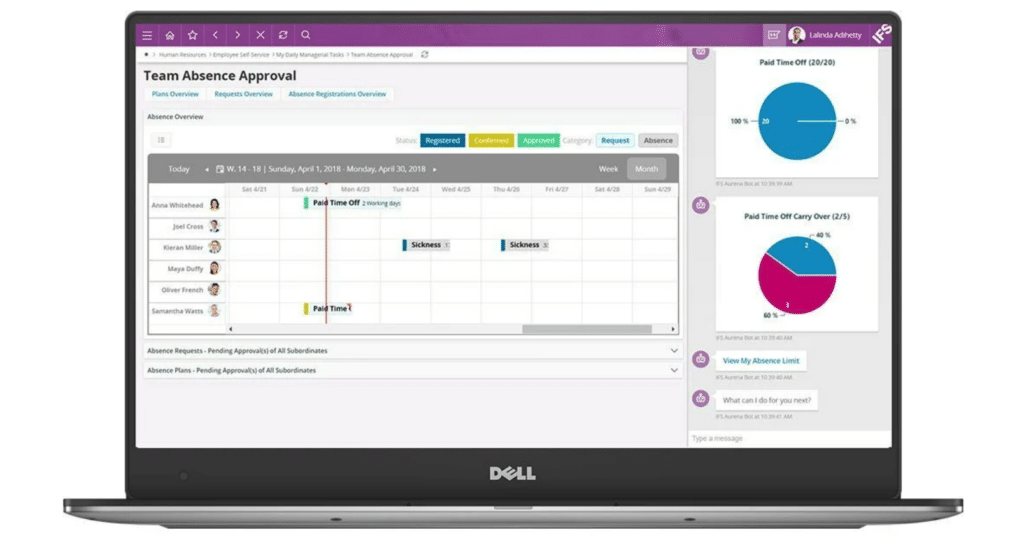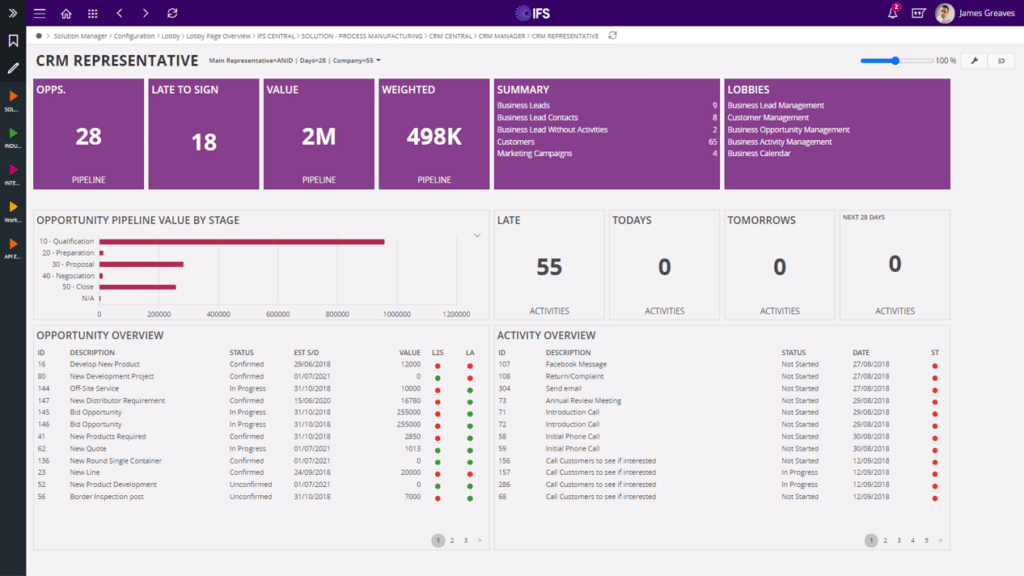In this review, I’m going to share my analysis and evaluation from my hands-on experience with IFS. But first, if you’re just beginning your search for the best enterprise resource planning (ERP) tools, check out my picks for the best ERP software. You probably already know that IFS is among the most popular ERP tools out there, but you need to better understand what’s good (and not so good) about it.
This in-depth IFS review will walk you through the tool's pros and cons, features and functionality, and more to help guide you to better understand its capabilities and its suitability for your needs.

IFS Product Overview
IFS provides an integrated suite of enterprise software solutions, including IFS cloud and enterprise asset management (EAM), designed to help businesses manage their resources and business processes effectively. Its primary users are mid to large-sized companies across various industries, including manufacturing, aerospace, construction, and services.
The benefits of IFS, a leading provider of cloud ERP solutions, include enhanced operational efficiency, improved decision-making capabilities, and increased agility in responding to market changes for any company size.
It addresses pain points such as complex project management, asset lifecycle management, and service-centric operations. Notable features of IFS include its IFS cloud-based industry-specific solutions, advanced analytics, and user-friendly interface, streamlining the workflow and permissions across various company sizes.
Pros
- Industry Specialization: IFS tailors its ERP solutions to specific industries, ensuring that businesses have tools finely tuned to their unique operational needs.
- Advanced Analytics: IFS provides robust analytics tools that help businesses turn data into actionable insights, fostering better decision-making.
- User Experience: The software offers a clean, intuitive interface that simplifies complex processes, enhancing user adoption and productivity.
Cons
- Learning Curve: New users may find the depth of IFS's features overwhelming, requiring a significant investment in training.
- Customization Complexity: While highly customizable, IFS can be complex to tailor, potentially necessitating additional support.
- Resource Intensive: The comprehensive nature of IFS solutions might demand considerable system resources, which could be a challenge for smaller IT infrastructures.
Expert Opinion
In my experience, IFS stands out for its commitment to industry-specific solutions, which allows it to offer a degree of specialization that can be a significant advantage over more generic ERP offerings. While the pricing structure can be a hurdle for some, the functionality and support provided justify the investment for businesses that require a robust, sector-focused ERP system. The interface is clean and modern, integrations are plentiful, and onboarding is comprehensive, although it can be a bit daunting for newcomers. IFS excels in environments that demand specialized functionality and are prepared to invest in a full-featured ERP system. When judging against competitors, IFS often outperforms in its analytics and user experience but may underperform for those seeking a quick setup or with limited IT resources.
IFS: The Bottom Line
What sets IFS apart is its ability to offer a tailored experience to industries that often have to make do with more generic solutions. It provides a level of detail and customization in its analytics and operations modules that can be a game-changer for businesses with complex, service-oriented processes. The software's real-time data processing and insights are particularly impressive, enabling companies to make swift, informed decisions. Its most noteworthy features include its industry-specific capabilities, advanced analytics, and a user interface that prioritizes efficiency and ease of use.

IFS Deep Dive
Let's take a detailed look at what IFS has to offer:
Product Specifications
- Financial Management - Yes
- Human Resources Management - Yes
- Manufacturing Operations - Yes
- Supply Chain Management - Yes
- Project Management - Yes
- Customer Relationship Management - Yes
- Procurement - Yes
- Order Processing - Yes
- Inventory Management - Yes
- Service Management - Yes
- Asset Management - Yes
- Quality Management - Yes
- Sales Management - Yes
- Marketing Management - Yes
- Business Intelligence and Analytics - Yes
- Compliance and Risk Management - Yes
- Product Lifecycle Management - Yes
- Field Service Management - Yes
- Data Import/Export - Yes
- Mobile Access - Yes
- Cloud or On-Premises Deployment - Yes
- Customization - Yes
- Multi-Currency Support - Yes
- Multi-Language Support - Yes
- Integration Capabilities - Yes
IFS Feature Overview:
- Financial Management: IFS offers robust financial management that allows for comprehensive control over finances, supporting complex regulatory requirements and international operations.
- Human Resources Management: The HR module in IFS provides tools for managing the entire employee lifecycle, from recruitment to retirement, with a focus on talent management and workforce planning.
- Project Management: IFS excels in project management, offering detailed project tracking and resource allocation, which is particularly beneficial for industries like construction and engineering.
- Manufacturing Operations: The software's manufacturing operations feature supports various manufacturing processes, including make-to-order, make-to-stock, and more, with real-time visibility into production.
- Supply Chain Management: IFS's supply chain functionality is designed to optimize the flow of materials and products, enhancing visibility and control from supplier to customer.
- Asset Management: With IFS, companies can manage the entire lifecycle of their assets, reducing downtime and maintenance costs while improving asset performance.
- Business Intelligence and Analytics: The analytics tools within IFS transform data into actionable insights, providing users with the intelligence needed to make informed decisions.
- Service Management: IFS's service management capabilities are tailored to help businesses manage and execute service operations efficiently, improving customer satisfaction.
- Mobile Access: IFS provides a mobile platform that ensures users have access to critical business functions from anywhere, enhancing flexibility and responsiveness.
- Customization: The platform's high degree of customization allows businesses to tailor the software to their specific needs, which stands out for companies with unique processes.
Standout Functionality
Industry-Specific Solutions: IFS offers solutions that are specifically designed for certain industries, providing a depth of functionality that is often unmatched by generic ERP systems.
Advanced Project Tracking: The project management capabilities in IFS are superior, with tools that allow for intricate project tracking and resource management, which is ideal for project-based industries.
Comprehensive Asset Lifecycle Management: IFS's asset management features go beyond simple maintenance, supporting complex asset lifecycle management that can significantly improve asset longevity and ROI.
Integrations
IFS offers a range of out-of-the-box integrations with other software and tools, enhancing its functionality and allowing for a more connected enterprise system. Some native integrations include:
- CRM systems for a synchronized flow of customer data.
- HR and payroll solutions for streamlined human resources processes.
- Business intelligence tools for enhanced data analysis and reporting.
IFS also provides an API, which allows for custom integrations and the ability to connect with a multitude of other systems and applications. Additionally, there are add-ons available that can extend the platform's capabilities, such as specialized reporting tools or industry-specific modules.
IFS Pricing
Pricing upon request. Interested parties can contact the IFS sales team by booking a demo.
Ease of Use
Navigating IFS's comprehensive suite of tools presents a steep learning curve, particularly for those not familiar with advanced ERP systems. The interface is clean, but the sheer number of features can make it challenging to find specific functions quickly. Onboarding requires a structured approach, and users often need formal training to leverage the system's capabilities fully.
Customer Support:
IFS provides a solid level of customer support, with various channels available, including documentation, webinars, and live chat. However, some users report that response times can be slow, and navigating the support system to find the right kind of help can sometimes be frustrating.
IFS Use Case
Let's have a look at who benefits the most from IFS.
Who Would Be A Good Fit For IFS?
Companies in industries like aerospace, manufacturing, and construction that require detailed project and asset management would find IFS a good fit. The system works well for mid-sized to large companies that need a comprehensive, industry-specific ERP solution.
Who Would Be A Bad Fit For IFS?
Small businesses or startups looking for a simple, quick-to-implement solution may find IFS overwhelming due to its complexity and the breadth of its features. Companies with limited IT resources may also struggle to maintain the system.
IFS FAQs
Here are answers to some of the most frequently asked questions about IFS.
What industries does IFS cater to?
IFS specializes in industries such as aerospace and defense, energy and utilities, manufacturing, and construction.
Can IFS be deployed on the cloud?
Yes, IFS offers both cloud and on-premises deployment options.
Does IFS support mobile access?
Yes, IFS provides mobile access to its ERP system for operational flexibility.
Is IFS customizable?
Yes, IFS is highly customizable to fit specific business needs.
Does IFS offer customer support?
IFS offers customer support through various channels, including documentation and live chat.
Can IFS integrate with other systems?
Yes, IFS has an API for custom integrations and offers several out-of-the-box integrations.
Does IFS provide training for new users?
Yes, IFS offers comprehensive training for new users to help them get the most out of the system.
Is there a free trial available for IFS?
The availability of a free trial for IFS can vary, and it's best to contact them directly for current offerings.
Alternatives to IFS
SAP ERP: Consider SAP ERP as a robust alternative with strong capabilities in financial and human capital management.
Oracle NetSuite: Oracle NetSuite is a good choice for those seeking a cloud-based solution with strong financial management tools.
Microsoft Dynamics 365: Microsoft Dynamics 365 stands out for its integration with other Microsoft products and services, making it ideal for businesses heavily invested in the Microsoft ecosystem.
IFS Company Overview & History
IFS crafts and supplies enterprise software to a global clientele involved in the manufacturing, distribution, asset management, and service-oriented sectors. This software is pivotal for businesses, especially those in the aerospace, manufacturing, and energy industries. As a publicly traded entity, IFS is accountable to its shareholders and has its headquarters nestled in Linköping, Sweden. Under the leadership of CEO Darren Roos, IFS is on a mission to deliver intuitive ERP software that empowers businesses to realize their objectives.
Since its inception in 1983, IFS has marked notable achievements, including the rollout of IFS Applications, which has significantly broadened its international presence, with a pronounced emphasis on markets in North America, the United Kingdom, and throughout Europe.
Summary
In this detailed review, I have explored the functionalities of IFS, aligning its features with the specific needs of its target audience. IFS stands out as an excellent choice for larger enterprises, particularly in industries like manufacturing, construction, and utilities, where complex project management and asset management are crucial.
While it offers robust capabilities in these areas, it may not be the first choice for very small businesses that require simpler systems. Its excellence in integrating complex supply chains, managing large-scale projects, and ensuring compliance is particularly noteworthy. I welcome your perspectives and invite you to join the discussion on how IFS has been useful in achieving your business goals in these demanding sectors.
